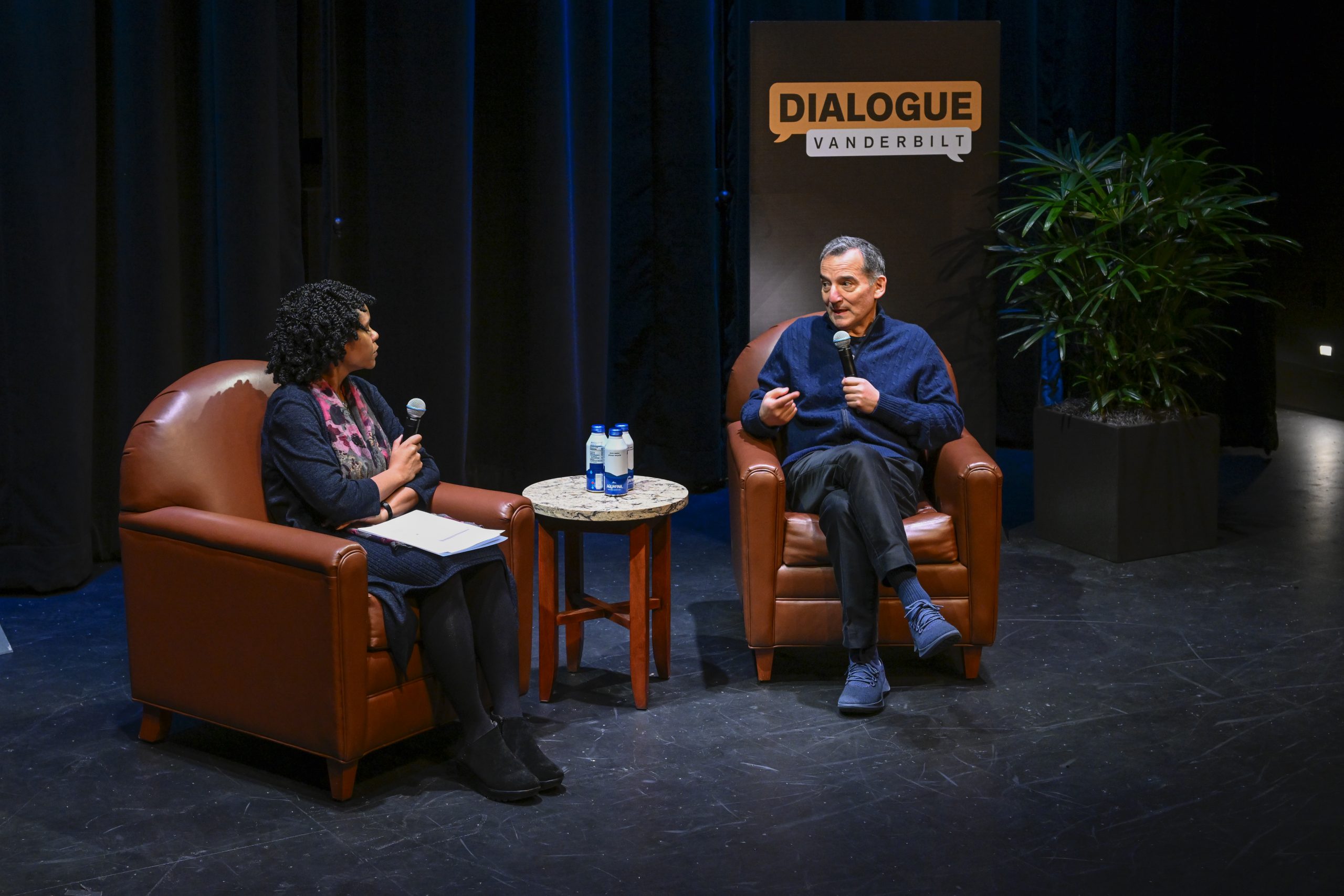Dialogue Vanderbilt recently hosted an insightful fireside chat between Rabbi David J. Wolpe and Vanderbilt Divinity School Dean Yolanda Pierce. The Jan. 18 event was part of a series organized by Dialogue Vanderbilt that aims to foster open discussions about faith and how it influences people dealing with pressing societal issues.
Maha Elgenaidi, founder and executive director of the Islamic Networks Group, will visit Vanderbilt’s Rothschild Black Box Theater on Feb. 19 at 5 p.m. for the next conversation in the series. Vanderbilt students, faculty and staff may register for in-person attendance. The broader community is invited to register to watch the livestream.
Vanderbilt Chancellor Daniel Diermeier set the stage for the conversation: “Today’s discussion is part of a series of conversations with faith leaders that aims to provide an open forum where we can explore the intersection of faith and the pressing issues that matter to us all. This is a space where we can share a range of perspectives and experiences through which we might come to better understand not only these issues, but one another and our shared humanity.”
Pierce kicked off the conversation with an exploration of “Why religion?”
Wolpe said religion, at its best, can be a powerful force for human unity. Americans today struggle with challenges like isolation and lack of community—problems that religion can combat through its integral aspects of shared values and regular gatherings.
He acknowledged that religious differences are often made more contentious by external factors like land, resources and power, and the discussion delved into the challenges and positives of religious pluralism.
Wolpe emphasized the importance of protecting the existence of varying religions and avoiding the imposition of a single religious viewpoint upon all a nation’s people. America, he said, has historically and largely successfully relied upon its democratic framework to prevent armed conflicts between religious groups.
Wolpe also stressed the value of listening—of evaluating every opinion for any seed of truth, whether the opinion is the one that wins in the end or not. The ability to transcend binary thinking, he added, is a crucial aspect of faith, and the Jewish tradition has a strong history of fostering constructive arguments.
While listening is vital, Wolpe said, equally important to navigating the challenges on college campuses today is the practice of speaking respectfully and thoughtfully. While hate speech exists and is not tolerated in the Vanderbilt community, it is important to be able to distinguish hate speech from simple expression of differing opinions. Speakers need to be mindful of their words to create an environment that’s conducive to real dialogue and not just talking past one another. Wolpe urged a deeper understanding of history to grasp present circumstances and foster empathy.
As the conversation shifted to the Middle East conflict, Wolpe bemoaned the lack of knowledge about the region and urged a deeper understanding of its history to grasp its present circumstances. Acknowledging the suffering of all parties involved, he said, would be a step toward fostering empathy and finding common ground.
The conversation then turned to a question-and-answer section from the audience’s pre-submitted questions. Wolpe addressed a question on whether it is possible to criticize Israeli policy without being antisemitic, to which he replied, “I do it all the time.”
A Jewish student talked about having to constantly defend his right to exist and his religion’s legitimacy, and he asked Wolpe how to navigate conversations with people who do not understand or acknowledge his experience as valid.
“At least a part of this has to do with the very strange position that Jews occupy in the cultural continuum in American life,” Wolpe said. “Jews get confined to categories that are illegitimate and that wipe out the very long and dispiriting history of Jewish suffering, because they’re now in the everything-is-fine category, as opposed to the suffering category. One doesn’t cancel the other; they can coexist.”
Wolpe challenged students to not assume that the categories they slot people into are going to apply to the individuals they meet. “One of the great qualities of human beings is they actually escape categories,” Wolpe said. “And people are a constant surprise if you get to know them. Be slower with your boxes and readier with your complexity.”
The discussion concluded with Wolpe answering the question “What gives you hope?”
“What gives me hope is paradoxically the same thing that worries me,” he answered. “People have an easy time disparaging groups of people, especially those they don’t know. But when they engage people one-on-one, you realize that there is—in almost every person that you are willing to meet and listen to—there is something wonderful and remarkable.
“Looking into someone else’s eyes, that’s something that, if it doesn’t give you hope, you’re not looking deeply enough.”
